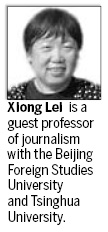Op-Ed Contributors
Debate: Is it proper for China to grow GM rice now?
(China Daily)
Updated: 2010-03-15 07:44
 |
Large Medium Small |
Xiong Lei: Decision should be left to end users
The government's approval to grow genetically modified (GM) rice, though on a trial basis, has again triggered a controversy over whether China should take the lead in subjecting a staple food crop to this technology.
It's not surprising to see GM-seed advocates condemn opponents for their "ignorance" of biotechnology and "phobia" for anything obtained through genetic modification. Champions of biotechnology will present all sorts of data and evidence to assure people that GM rice is safe.

Yet the core question concerning the GM rice issue is not whether it is safe but whether people's rights will be honored, especially their foremost right to choose what they eat. Do people have the right not to consume GM rice and other GM crops? Will the Ministry of Agriculture (MOA) guarantee people their right to choose non-GM food?
Even if a person is convinced that GM rice is safe, he or she should not be forced to consume it. And GM seed companies should not be allowed to change the situation in the farming sector to such an extent that people would be left with no option but to consume GM rice.
Such a worry is not groundless. Years ago, GM cotton seeds were introduced to China without telling farmers what they were. They were marketed as "super cotton" seeds. As a result, a large number of farmers across the country had begun growing "super cotton" seeds even before it received official approval.
We thanked heaven that (GM) cotton was not a food crop. But food crops were not spared the GM dose for long. GM soybean and corn began dominating our edible oil market even before we became aware of it. The MOA actually still owes us an explanation for this.
We cannot surrender our rights again to choose what we want to grow and eat now that the MOA has agreed to conduct trials with GM rice seeds. We have the right, and that right is sacred, to refuse GM rice on our dinner tables.
So if the ministry's decision to conduct trials with GM rice seeds is irreversible, effective measures should be taken to ensure the fields it is planted on are segregated and do not pollute non-GM rice fields. The MOA has to take steps to punish any violation, too.
Next comes people's right to know. Apart from the possible GM ingredients contained in food packets on supermarket shelves, we should be convinced that GM rice is not the only solution to the food problem we are facing or are likely to face before we are forced to eat it.
People need to know, too, why no other country is growing GM grain for direct human consumption. Have other biological means been exhausted to solve the food problem? Before asserting the use of GM rice seed did the authorities and "official" scientists try other ways to meet the challenge?
Data provided by GM-grain advocates shows that by 2005 - decades after GM seeds were introduced - only about 8.5 million farmers in 21 countries were growing GM crops. This is a small figure compared to the total number of farmers in the world. Then why should China be so eager to lead the world in commercialization of GM rice? This leads us to a vital question: Does the country spend enough on research in and development of grains. Sources say researchers in GM organisms have dominated the grants allocation, many of who have personal commercial interests in promoting GM food. If that is true, the authorities should never grant permission for GM rice cultivation.
Finally, as end users people should have the final say on GM rice. Since it concerns our staple, the decision to grow GM rice should not be left to the whim and fancy of a few fanciful researchers.









